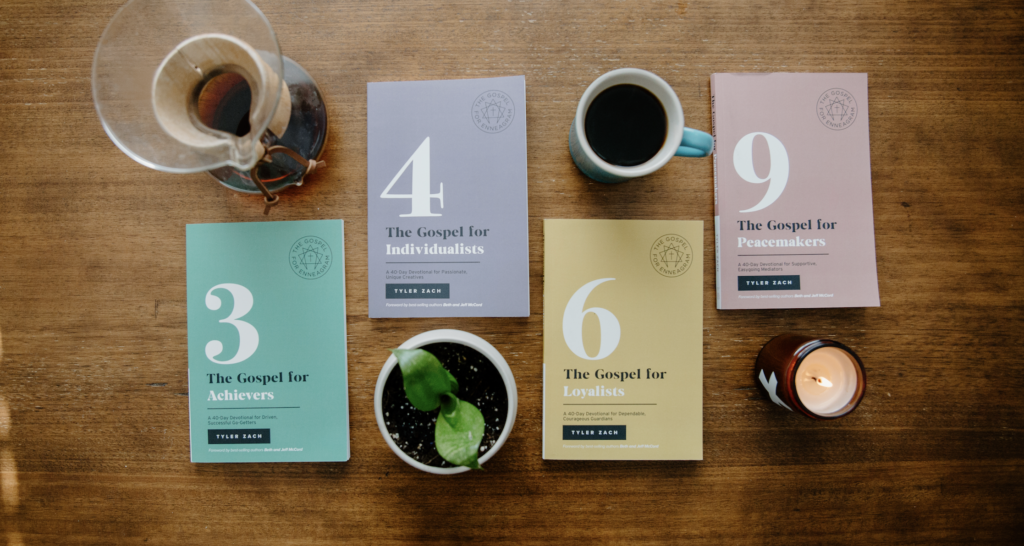Hello, Two!
You are wanted. You are generous, hospitable, empathetic, unselfish, caring, affirming, supporting, sacrificing, and nurturing. You are always thinking about others, and yes, we feel the love! But let me ask you: Who are you when no one needs you? What if you didn’t have to be needed to feel wanted?
These are important questions because you are in higher demand than any other personality type. You are always there for us. You show up when we need you the most. At the same time, your worth doesn’t come from being needed but from the One who made you. The truth we’ll unpack together in this book will be challenging and freeing at the same time, but it can all be wrapped up in this one simple statement: God doesn’t need you—He wants you. Though others may have made you feel you were loved because of your helping hands, God wants you just for being you.
Because God created you, He gets you! Your heavenly Father holds space for every emotion you’ve ever felt and expressed. Your emotions aren’t too much for Him—and in fact, they make you more like Him. While Jesus represents the head, Twos are the “heart” of the body of Christ, leading us with understanding and compassion. Though expressing feelings is still frowned upon in many families and workplaces, God wants you to be brave in letting your full self be heard. He wants you to know you have what it takes to help the world “get out of our head” and live as cherished human beings, not human doings.
The Gospel Affirms Helpers
God sympathizes with Helpers’ worldview. This selfish world lacks love in many ways, filled with thoughtless, insensitive, and unthankful people, and we need caring, supportive Helpers who will show up for others in their time of need, lead us to live sacrificially in a culture that only thinks of themselves, teach us how to be understanding and empathetic, and demonstrate how to love our neighbor as ourselves. Therefore, Helpers will be happy to know the Bible affirms the following beliefs:
- God created us to be warm and affectionate. “Love one another with brotherly affection. Outdo one another in showing honor.”
- God created us to be selfless and caring. “And the crowds asked him, ‘What then shall we do?’ And he answered them, ‘Whoever has two tunics is to share with him who has none, and whoever has food is to do likewise.’ ”
- God created us to be generous and hospitable. “Contribute to the needs of the saints and seek to show hospitality.”
- God created us to be present and empathetic. “Rejoice with those who rejoice, weep with those who weep.”
- God created us to be kind and encouraging. “Therefore encourage one another and build one another up, just as you are doing.”
- God created us to be appreciative and thankful. “Rejoice always, pray without ceasing, give thanks in all circumstances; for this is the will of God in Christ Jesus for you.”
- God created us to alleviate pain and suffering: “Religion that is pure and undefiled before God the Father is this: to visit orphans and widows in their affliction, and to keep oneself unstained from the world.”
The Gospel Challenges Helpers
The gospel also provides specific challenges to Helpers. Now we’ll explore the most common lies Twos believe and see how the Bible provides much better promises and blessings. We will move deeper into each of these throughout the next 40 days.
- Lie #1: I am not wanted or lovable as I am. Twos fear that they will be rejected for being unwanted or unlovable. Therefore, they strive to present a likable, acceptable image in the eyes of others. They fall into the trap of telling themselves, “I can make people like me by being less like me” which leads to disowning the parts of themselves that are truly valuable. But keeping the mask on indefinitely will only perpetuate the lie that you are not loved for who you really are. You are the one Christ lived and died for, and with Him you never have to be someone else. He came to offer a proposal of eternal love and friendship, so you don’t have to keep guessing whether you are worth pursuing or if love will ever come. You are wanted, loved, and cherished right now just as you are.
- Lie #2: I’m only worthy of love when I’m helpful. Twos feel a deep sense of “needing to be needed” because they think to themselves, If you need me, you won’t reject me. But the amazing truth is that God didn’t create you because He needed something from you but because He wants you. When you drift from the gospel promise that you are worthy because of Christ, you will work under the assumption, I am needed and worthwhile because of what I can do for you. Driven by a fear of becoming useless or replaceable, Twos will labor for love by helping or befriending others instead of living from God’s love. But the truth is you are loved for whose you are, not what you do for others. Jesus died on the cross for you—for your real self, not your generous, helpful, crafted self.
- Lie #3: I must give to get what I need. Twos fear that if they honestly and forthrightly share their needs with others, they might be rejected and feel humiliated for asking. Therefore, to get their emotional needs met, they “give to get,” although this happens mostly unconsciously. They may buy gifts, give compliments, or serve others with the hope (or expectation) that others will return the favor when the time comes. Therefore, what appears to be altruistic giving comes with hidden strings attached. But Jesus, having only pure intentions, gave Himself for us expecting nothing in return. We don’t have to give anything to get His ongoing favor and approval; His love is given as a free gift, not something that can be earned or exchanged for more affirmation.
- Lie #4: I’m not enough without others. Twos are prone to finding their identity in relationships. They find deep emotional connections—romantic and platonic—to be the juice of life. The lie Twos are led to believe is, I’m not enough without others. When Twos forget their perfect union with Christ, they exaggerate their need for others and will seek to merge with them, asking, “Who do they want me to be?” They may sacrifice their own needs, dreams, or freedom to gain approval and prevent rejection. But the good news is you can pile all of the deepest longings of your heart onto someone without having to make unhealthy sacrifices. When you begin a relationship with Christ, as His beloved, rather than losing yourself or becoming someone you’re not, you become more of who you were created to be.
- Lie #5: Others can’t live without me. The vice of the Two is pride, but not the haughty, conceited, or arrogant version that people usually think of. For the Two, pride sounds like I will make myself so indispensable to your life (or team) that you won’t be able to get along without me. Though Twos are a beautiful reflection of God’s love and care, when they forget their finiteness, they may seek to become “The Helper” in people’s lives. But unlike the Holy Spirit, they do not have unlimited energy and resources, which may cause resentment or burnout when taking on too much responsibility for others. Pride also manifests itself through an unwillingness to ask for or receive help. Therefore, humility, the virtue of the Two, involves acknowledging your human limits and embracing your neediness, understanding that being a disciple of Jesus means allowing Him and others to wash your feet.
- Lie #6: Others’ needs are more important. Average Twos find it easier to sacrifice their own needs to make others happy. When their own needs rise to the surface, the Twos’ primary defense mechanism of repression kicks in, causing them to deny their personal needs and feelings to the point of pretending they don’t have any. The lie they believe is that it is “selfish” to have needs or ask for help. But Jesus, who delights in serving you and wants you to help others without hurting yourself, desires that you fully express your needs so you can get back all that helping energy you’ve so generously given. Like the biblical character Martha learned, God wants you to do less standing and more sitting because you need Jesus more than Jesus needs you.
As you can see, the gospel will challenge your perception of the protagonists and antagonists in your life. In the Helper’s benevolent kingdom, those who are the most affirming and sacrificial are rewarded while those who are ungrateful and self-centered are punished. Your heroes become those who boost your self-esteem, reciprocate your help, say thank you, acknowledge you, and tell you they can’t live without you! Likewise, your villains become those who force you to acknowledge your limits, challenge you to slow down and rest, give you constructive criticism, reject your offers to help or spend time together, and those hard-to-please people who are not easily won over by your charisma.
God’s kingdom will not be filled with those who prided themselves on being indispensable to others, but rather men and women who came helpless to the throne of grace and depended on Christ’s sacrifice alone for salvation. In this place, a need to be needed is exchanged for neediness; self-denial for self-care; self-forgetfulness for self-love; codependency for healthy boundaries; and helping people become more dependent on the Holy Spirit, not you. In this place, you live for God rather than the eyes of others, learn to express your needs rather than repress them, ask for permission rather than assuming you know what others need, and receive divine courage to let some of your relationships end so that the next chapter of your life can truly begin. In this place, you can finally learn to say no to others so that you can say yes to the Shepherd’s invitation to lay down in green pastures and rest beside still waters until all your needs are met.
Are you still skeptical of the Enneagram? Check out my FREE resource called “Should Christians Use The Enneagram?” where I discuss the roots and origins of the Enneagram.
Next Step: Get the 40-Day Devotional
For the Enneagram Two—the Helper—life is all about relationships. While our lonely and hurting world needs your care and sacrificial love, sometimes your sense of responsibility for others causes you to become overextended, exhausted, and left feeling underappreciated.
Certified Enneagram Coach and pastor, Tyler Zach, offers this 40-day devotional to help you hear from God and encourage you as you make the world a more loving place through your empathy, nurture, and support.
Inside, you’ll discover how to overcome people pleasing, set healthy boundaries in your relationships, practice self-care without feeling selfish, love yourself as much as you love others, and find rest by helping people to become more dependent on the Holy Spirit rather than yourself. Be prepared to encounter a supportive God who perfectly understands you and wants to take care of all your needs.
Get the “The Gospel for Helpers: A 40-Day Devotional for Caring, Empathetic Supporters: (Enneagram Type 2)” on Amazon right now. Click here to receive a free 5-day devotional to test drive the book.

Check out this page to view the other 40-Day devotionals in this series by Tyler Zach. This will make the perfect gift for a family member or friend. You can also subscribe to the email list to get Book Launch announcements and an invite to receive Advance Reader Copies.
Follow Gospel For Enneagram to join the growing tribe of 45K!
Subscribe to watch a NEW video every week!






 Subscribe to my channel
Subscribe to my channel